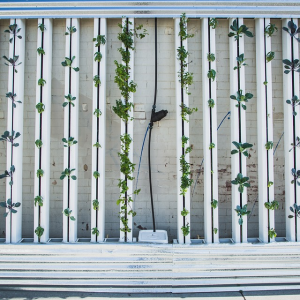
This paper reviews the literature on the sustainability of four technologies that are being developed for use in sustainable food systems: vertical farming, plant-based alternatives, food delivery services and blockchain in food systems. These four technologies were chosen because they have recently attracted significant investments in the Nordic region.
The four technologies studied are:
- Vertical farming - multi-layer indoor crop cultivation.
- Plant-based alternatives - vegan foods intended to mimic meat, dairy, seafood and eggs.
- Food deliveries - delivery of meals and groceries purchased online by various means of transport.
- Blockchain technology - a decentralised ledger technology that can be applied to supply chain traceability initiatives.
The figure below shows the coverage of the existing literature on various sustainability impact categories for three of the four technologies. Research gaps include the social impacts of vertical farming, food deliveries and to some extent plant-based alternatives; economic implications of food deliveries; and some environmental impact categories in relation to vertical farming and food deliveries.
Image: Figure 3, Bunge et al. Sustainability indicators assessed in the included literature. HTP, human toxicity potential; WTB, willingness to buy; WTP, willingness to pay.
Key points reported for these three technologies include:
- Plant-based alternatives tend to have lower environmental impacts (climate change, water use and land use) than their animal-based equivalents, with some exceptions. Nutritionally, plant-based alternatives have mixed performance in comparison to animal-based products, generally having lower protein content, less saturated fat and sometimes higher sodium content. Plant-based alternatives tend to be less accepted by consumers and also more expensive than animal-based equivalents.
- There is a consensus that growing vegetables in vertical farming systems outperforms field and conventional greenhouse cultivation in terms of land use and water use; vertical farming produces higher greenhouse gas emissions than field cultivation but less than greenhouses; and vertical farming uses more energy than both field and greenhouse cultivation..
- Grocery delivery tends to perform better on climate impact and energy use than retail trips made by car, but not compared to retail trips made by foot, bicycle or public transport. Meal delivery tends to have worse environmental performance than preparing meals at home or eating meals at a restaurant, mostly because of plastic food packaging waste.
Literature review findings for blockchain in the food sector are presented differently - see below - as the literature tended to use different methods for blockchain compared to for the other three technologies and did not quantify blockchain’s impacts on the food sector. Some of the main benefits shown in case studies are better food quality and safety, through strengthened food supply chain traceability.
Image: Figure 4, Bunge et al. Benefits and limitations of deploying blockchain to the food sector.
Abstract
Food system technologies (FSTs) are being developed to accelerate the transformation towards sustainable food systems. Here we conducted a systematic scoping review that accounts for multiple dimensions of sustainability to describe the extent, range and nature of peer-reviewed literature that assesses the sustainability performance of four FSTs: plant-based alternatives, vertical farming, food deliveries and blockchain technology. Included literature had a dominant focus on environmental sustainability and less on public health and socio-economic sustainability. Gaps in the literature include empirical assessments on the sustainability of blockchain technology, plant-based seafood alternatives, public health consequences of food deliveries and socio-economic consequences of vertical farming. The development of a holistic sustainability assessment framework that demonstrates the impact of deploying FSTs is needed to guide investments in and the development of sustainable food innovation.
Reference
Bunge, A.C., Wood, A., Halloran, A. and Gordon, L. J. (2022). A systematic scoping review of the sustainability of vertical farming, plant-based alternatives, food delivery services and blockchain in food systems. Nature Food
Read the full paper here or here (PDF link). See also the TABLE blog Spotlight on urban, vertical and indoor agriculture.







Post a new comment »